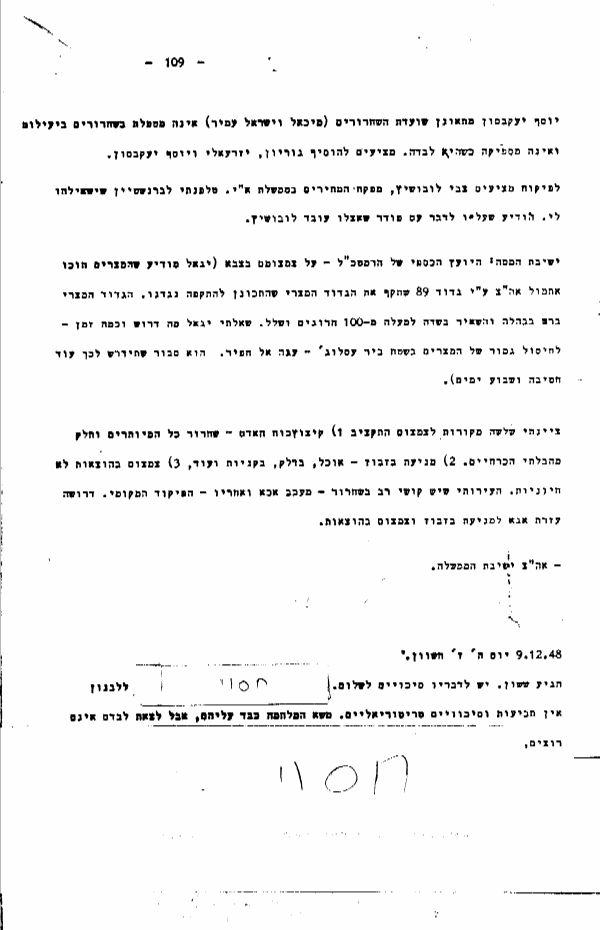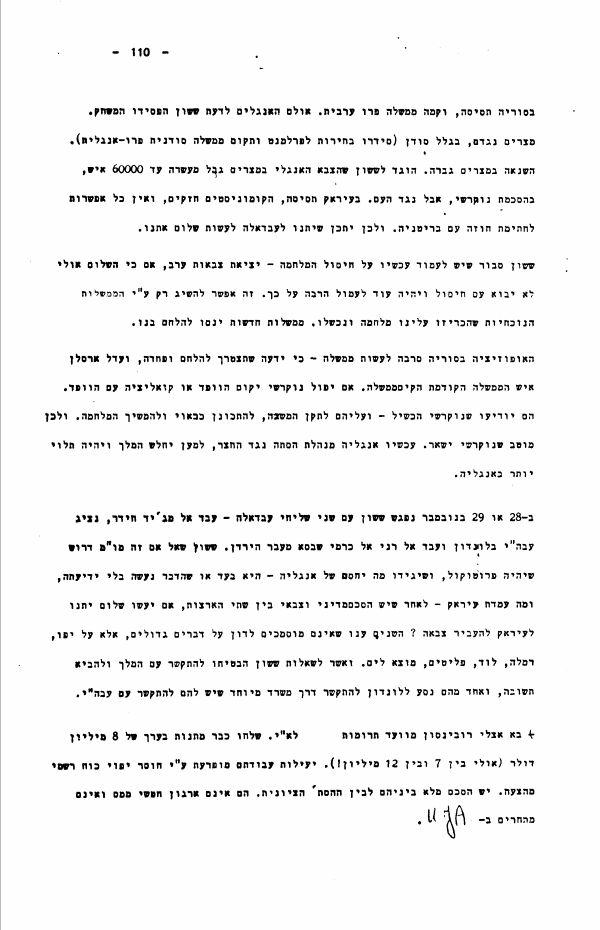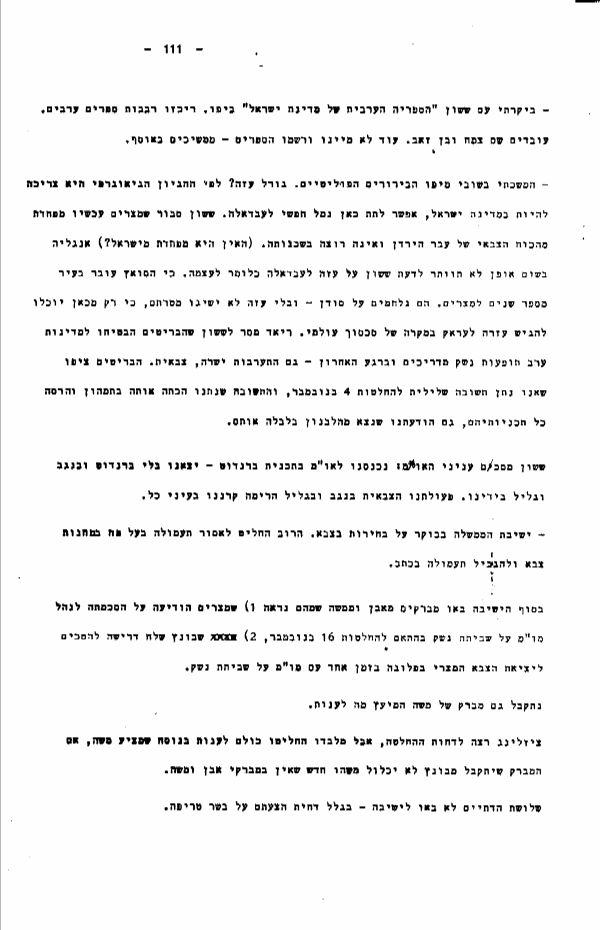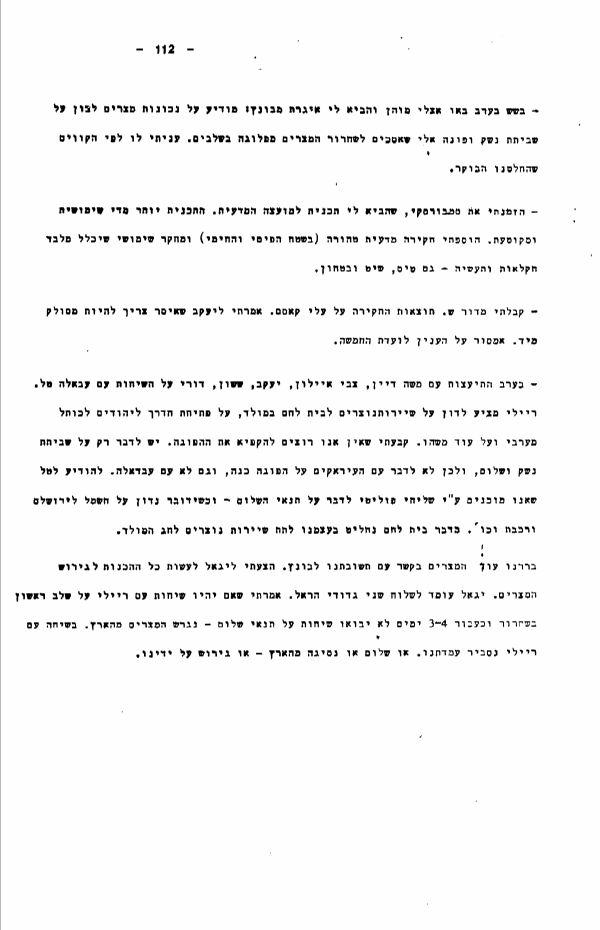Thursday, December 9, 1948
[Eliahu] Sasson arrived [from Paris]. According to him there's a chance for peace. [Lebanese Prime Minister] Riad [al-]Sulh [a Sunni Muslim] is prepared to work for us. Lebanon has no territorial demands or prospects. The burden of the war is heavy for them, but they don't want to pull out alone, and therefore they want everyone to pull out. Riad [al-]Sulh has no chance of rising - he's reached the highest possible status for a Muslim in Lebanon. Outside of Lebanon there's no hope, and his only ambition is to be influential in the [Arab] League.
In Syria there's unrest, and a pro-Arab government [that supports cooperation with Arab states] has been established. But the English lost the game, in Sasson's view. Egypt is against them. Because of Sudan ([where] parliamentary elections were arranged, and a pro-English Sudanese government will be established) hatred has increased in Egypt. Sasson was told that the English army in Egypt grew from ten to sixty thousand men, with the consent of [Prime Minister] Nuqrashi but against the [wishes of] the people. In Iraq there's unrest, the Communists are strong, and there's no hope of signing a contract with Britain, and therefore it's possible that they'll allow Abdallah to make peace with us.
Sasson thinks that now it's necessary to insist on ending the war - withdrawal of the Arab armies, even though peace might not come with the [war's] end, and there will be a lot of work to do for it. This can only be achieved by the current governments, which declared war against us and failed. New governments will try to fight us.
The opposition in Syria refused to form a government - because it knew that it would have to fight - and Adil Arslan, a member of the previous government, formed a government. If Nuqrashi falls, the Wafd [a nationalist political party headed by Nahas Pasha] will rise, or a coalition with the Wafd [will be formed]. They'll announce that Nuqrashi failed - and they must remedy the situation, must properly prepare to continue the war. And therefore it's better that Nuqrashi remain. Right now England is engaging in incitement against the monarchy, in order to weaken the king and make him more dependent on England.
On November 28 or 29 Sasson met with two emissaries of Abdallah's - ''Abd al-Maguid Khaider [sp.], Transjordan's envoy to London, and ''Abd al-''Ayni al-Karmi [sp.] - who came from Transjordan. Sasson asked: if these are negotiations, it's necessary to take minutes, and to say what England's attitude is - is it supportive - or is this taking place without its knowledge; and what is Iraq's position - given that there's a political and military agreement between the two countries. If they make peace, will they allow Iraq to move its army through [Transjordan]? They replied that they're not authorized to discuss major issues, but only Jaffa, Ramle, Lod, refugees, access to the sea. And as to Sasson's questions, they promised to contact the king and bring an answer, and one of them went to London to contact Transjordan through a special office they have.
- [Adolph] Robinson from the committee for donations in kind (?) to Eretz Israel came to see me. They've already sent gifts worth $8 million (perhaps between 7 and 12 million!); the efficiency of their work is undermined by the lack of an official representative from the army. There's complete agreement between them and the Zionist Organization. They are not a tax-free organization and do not compete with the UJA.
- With Sasson I visited the Arab Library of the State of Israel in Jaffa. Thousands of Arabic books have been collected. [Edward] Semakh [sp.] and [Dr. Israel] Ben-Ze'ev [sp.] work there. They haven't yet classified and registered the books. They're still collecting.
- While returning from Jaffa I continued my political consultations [with Sasson]. The fate of Gaza? In terms of geographic logic, it should be part of the State of Israel; [we] could give Abdallah of a free port here. Sasson thinks that Egypt is now afraid of Transjordan's military might and doesn't want it as a neighbor. (Isn't it afraid of Israel?). Under no circumstances will England concede Gaza, in Sasson's view, [but will demand it] for Abdallah, that is, for itself, because in a few years the Suez will go to Egypt. They're fighting over Sudan - and without Gaza they won't achieve their aim, because only from here can they assist Iraq in the event of a global conflict.
Riad [al-Sulh] told Sasson that the British promised the Arab states large amounts of weapons, instructors, and at the last minute - also direct, military intervention. The British expected us to respond in the negative to the November 4 resolution, and the answer we gave stunned them and destroyed all their plans. Our announcement that we would leave Lebanon also confused them.
Sasson summarizes the UN [General Assembly] matter: We came into the UN through the Bernadotte plan - we left without Bernadotte, and the Negev and the Galilee are in our hands. Our military activity in the Negev and the Galilee enhanced our prestige in the eyes of all.
- Government meeting in the morning on elections in the army. The majority decided to prohibit oral propaganda on the army bases and to restrict written propaganda.
At the end of the meeting cables arrived from [Abba] Eban and Moshe [Sharett], indicating that: 1) Egypt gave its consent to conduct negotiations on an armistice in accordance with the November 16 resolution, 2) Bunche sent a request [that we] agree to withdrawal of the Egyptian army from Faluja simultaneous to negotiations on an armistice.
A cable also arrived from Moshe advising how to respond.
[Aharon] Zisling wants to postpone the decision, but aside from him everyone decided to respond as Moshe proposed, if the cable that will arrive from Bunche doesn't include something new that isn't in Eban's and Moshe's cables. The three religious [government members] didn't attend the meeting - because of the rejection of their proposal regarding unkosher meat.
- At 6 p.m. [Dr.] Mohan [sp.] [from the UN staff] came to see me and brought me Bunche's cable: [he] conveys Egypt's willingness to discuss an armistice, and seeks my agreement to release the Egyptians from Faluja in stages. I replied to him along the lines we decided in the morning.
- I summoned [Prof. Shmuel] Sambursky, who brought me a plan for a scientific council. The plan is too applied [too focused on applied science?] and fragmented. I added pure scientific research (in the areas of physics and chemistry), and applied research that - aside from agriculture and industry - will also include aeronautics, nautical [science], and defense.
- I received the findings of the investigation on the matter of ''Ali Qasim from David Shaltiel. I told Ya'akov that Isser [Be'eri] should be ousted immediately. I'll report on the matter to the Committee of Five.
- In the evening a consultation with Moshe Dayan, Zvi Ayalon, Ya'akov [Shimoni], [Eliahu] Sasson, [Ya'akov] Dori on the talks with Abdallah [al-]Tall. Riley proposes discussing convoys of Christians to Bethlehem during Christmas, access for Jews to the Western Wall, and something else. I asserted that we do not want to freeze the truce. [We] should only discuss an armistice and peace, and therefore not discuss a "genuine truce" with the Iraqis, nor with Abdallah. Tall should be informed that we're prepared to talk, via a political messenger, about the terms of peace, and when the talks commence - we'll discuss electricity for Jerusalem, and the railway, etc. Regarding Bethlehem, we'll decide for ourselves on allowing Christian convoys for Christmas.
We consulted on the issue of the Egyptians in terms of our reply to Bunche. I suggested that Yigael [Yadin] make all the preparations for the expulsion of the Egyptians. Yigael will send two Harel battalions. I said that if there are talks with Riley on the first phase of release [from Faluja], and talks on terms for peace don't start within 3-4 days - we'll expel the Egyptians from the country. In the conversation with Riley we'll explain our position: either peace or withdrawal from the country - or expulsion by us.












